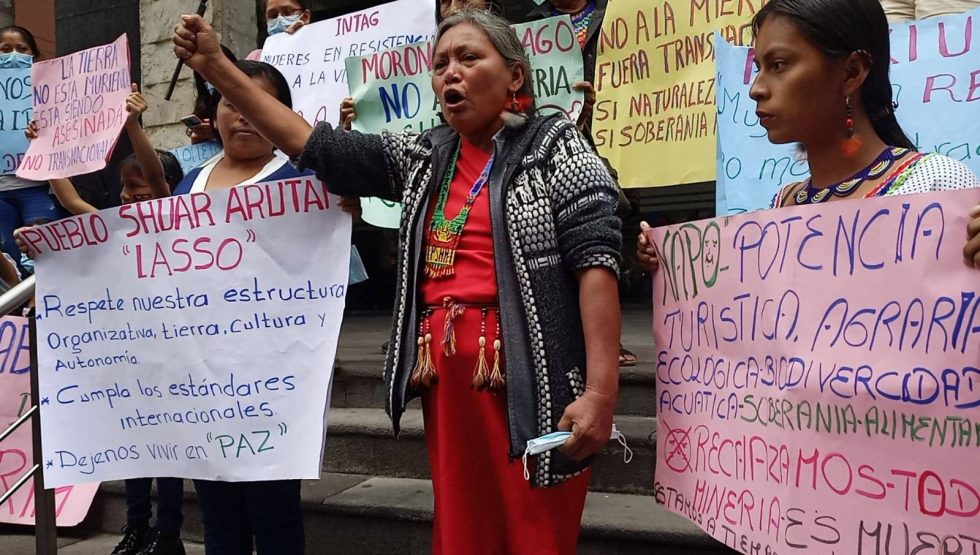This article was first published on Foreign Policy in Focus. You can read the original here.
Historically, pandemics have forced humans to break with the past and imagine their world anew. This one is no different. It is a portal, a gateway between one world and the next.
We can choose to walk through it, dragging the carcasses of our prejudice and hatred, our avarice, our data banks and dead ideas, our dead rivers and smoky skies behind us. Or we can walk through lightly, with little luggage, ready to imagine another world. And ready to fight for it.
Arundhati Roy, April 2020
Just over two years ago when lockdowns were being declared like dominoes around the world, there was a brief moment when the COVID-19 pandemic seemed to hold the potential for much-needed reflection. Could it lead to a reversal away from the profit-driven ecological and socio-economic dead end we’ve been propelling toward?
Arundhati Roy’s call to critical reflection was published in early April 2020. At the time, she was observing the early evidence, on one hand, of the devastating toll of the pandemic as a result of extraordinary inequality, the privatized health care system, and the rule of big business in the U.S., which continued to play out along lines of class and race.
She was also writing with horror at how the Modi government in India was enacting an untenable lockdown on a population of over a billion people without notice or planning, in a context of overlapping economic and political crises. While the rich and middle class could safely retreat to work from home, millions of migrant workers were forced out of work into a brutal, repressive, and even fatal long march back to their villages. And that was just the beginning.
The jarring “rupture” with normality that Roy wrote about two years ago has reinforced many “prevailing prejudices”, as she anticipated. Whether we’re talking about Amazon, the pharmaceutical industry, or mining companies, big business managed to have itself declared “essential” and profit handsomely. Meanwhile, poor and racialized people have paid the highest costs and experienced the greatest losses in the U.S., India, and many other countries around the world.
But we have also seen how people have fought back hard showing tremendous resilience in the face of greater adversity.
This is very much the case in mining-affected communities around the world, many of whom were already in David and Goliath battles before the pandemic to protect their land and water from the harms of mineral extraction. They have found no reprieve since the pandemic began.
While taking measures to protect themselves from COVID-19, these movements have refused to let their guard down as governments and corporations have taken advantage of greater social constraints to advance the mining industry.
A Pandemic Made to Fit the Mining Industry
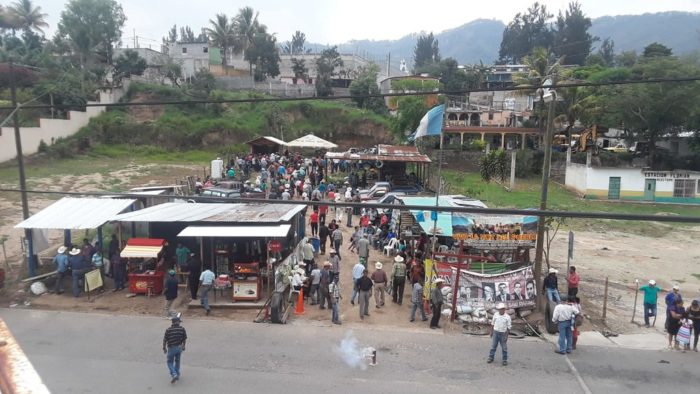
Since April 2020, the IPS Global Economy Project has been participating in the Coalition Against the Mining Pandemic, which came together to help document what was happening in the mining sector during the pandemic. The coalition is made up of environmental justice organizations, networks, and initiatives from North America, Europe, Asia-Pacific, Africa, and Latin America that work in solidarity with mining-affected communities.
The group observed early evidence that mining companies would be among the worst pandemic profiteers. In the past, after all, these corporations have sought to benefit from floods, coups, dictatorships, and other disasters to rewrite laws and push projects through while local populations are busy dealing with catastrophe and living under the gun.
In addition, the coalition especially wanted to understand what the pandemic meant for the struggles of Indigenous peoples and other mining-affected communities on the frontlines with whom we work in solidarity.
This collaborative research effort has involved local partners in 23 countries to document what it’s been like trying to protect community health from the ravages of the pandemic — while also fighting against the threat of losing their water and territory from the long-term impacts of gold, iron-ore, copper, nickel, coal, and lithium mining.
The 23 countries where we looked at cases have recorded 29 percent of the world’s known COVID cases, 43 percent of recorded COVID-related deaths, and include two of the top ten countries for the highest mortality rates (calculated by dividing the number of recorded COVID cases by the number of COVID related deaths). In order, these are Peru and Mexico. (Ecuador, where we looked at another case study, now ranks 11th.)
As expected, our recently released Latin America report No Reprieve demonstrates how COVID-19 restrictions seem to have been made to fit the mining industry. As Price Waterhouse Cooper observed in its 2021 Great Expectations report on the global mining industry, “by any important measure, mining is one of the few industries that emerged from the worst of the COVID-19 pandemic economic crisis in excellent financial and operational shape.”
Precious metal prices rose in the context of the uncertainty created by the pandemic, leading to historic profits for some companies despite lower production in 2020. Prices for base metals, such as copper, soon followed as markets opened up. This was much earlier than the lifting of social constraints, putting affected communities at an even greater disadvantage than before the pandemic in their struggles for water, land, and survival.
No Reprieve for Mining Affected Communities
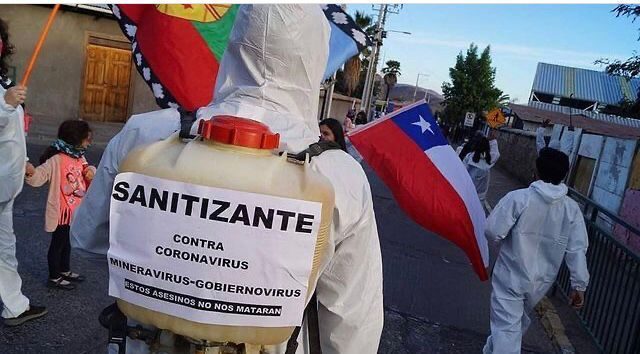
The lengthy lockdowns and other public health measures that were put in place not only spelled greater socio-economic crisis than before for these communities. They also meant greater difficulty or outright bans on meeting together to discuss concerns about environmental contamination, hardship, mining projects, and the greater difficulty of dealing with government offices responsible for permitting and inspections.
Online meetings were often inadequate or unavailable. When there was no other option but to get together to protest, the risks were greater than ever.
In Brazil, as in many other countries in Latin America, mining has continued pretty much without interruption since the start of the pandemic. For over a year, the community of Aurizona in the state of Maranhão has been living without an adequate supply of drinking water since the rupture of a tailings dam at the Aurizona gold mine owned by Mineração Aurizona S.A. (MASA), a subsidiary of the Canadian firm Equinox Gold.
On March 25, 2021, at the height of the pandemic in this part of northwestern Brazil, the Lagoa do Pirocaua tailings dam overflowed, contaminating the water supplies of this community of 4,000 people. Despite company promises, the community continues to lack adequate water supplies. Meanwhile, the company obtained a legal ruling that prohibits street blockades and filed a lawsuit against five movement leaders to try to deter their organizing.
In Colombia, Indigenous Wayúu and Afro-descendant communities in the La Guajira region experienced heightened risks from the continued operation of the Cerrejón mining complex, the largest open-pit thermal coal mine in Latin America. This mine is now owned exclusively by Swiss commodities giant Glencore, which consolidated its control over the mine in January 2022 when it purchased the shareholdings of Anglo American and BHP Billiton.
This mine has already operated for over three decades and displaced dozens of communities. In September 2020, the United Nations Special Rapporteur on Human Rights and the Environment, David Boyd, asked the Colombian government to at least temporarily suspend Cerrejón’s operations, pointing out that the contamination, health impacts, and lack of water the communities already faced increased the risk of death from COVID-19.
Instead, the mine continued and even accelerated operations, while communities suffered serious physical and emotional impacts from greater social confinement and loss of subsistence economic activities. The company donated food and safety equipment to improve its image, but this generated divisions and disagreements among communities that were difficult to resolve given the restrictions on meetings.
Making this situation worse, the government and companies have refused to respect a 2017 Constitutional Court decision that recognized violations of community rights to water, food, sovereignty, and health in authorizing the diversion of the Bruno Creek’s natural course to expand coal extraction. Instead, since mid 2021, Glencore and Anglo American have been suing the Colombian government under the terms of bilateral international investment agreements with Switzerland and the United Kingdom for not letting them expand the mine.
Militarized Mining

Not only did the spaces for community organizing shrink, disappear, or just get a lot harder, violence got worse in many places. In many cases, there was heavy-handed repression, heightened militarization, and ongoing legal persecution of land and environment defenders.
In Honduras, the Tocoa Municipal Committee for the Defense of the Natural and Public Commons spent nearly the entire first two years of the COVID-19 pandemic fighting for the freedom of eight water defenders who were arbitrarily detained for their peaceful opposition to an iron ore project owned by the Honduran company Los Pinares Investments.
They were only freed in February 2022, after the narcodictatorship of former President Juan Orlando Hernández lost power to the country’s first female president, Xiomara Castro. Meanwhile the company, which has ties to U.S. steel company Nucor, managed to start operations in mid 2021 without obtaining the required environmental permit, immediately putting in danger the future of the San Pedro river on which downstream communities depend.
In Mexico, a special group of public armed forces called the Mining Police was inaugurated in 2020, aimed at protecting mining facilities from mineral theft. The recruitment of troops was announced for the first time in July of that year, during an online event entitled “The reactivation of mining in the face of the new normality.” By the end of September 2020, the first 118 federal officers with military training had graduated and were deployed to guard the La Herradura gold mine owned by the Mexican company Fresnillo plc, which is listed on the London Stock Exchange and owned by Industrias Peñoles.
In contrast, no measures have been taken to lower the levels of subjugation, extortion, forced displacement, and violence against the communities that inhabit these same areas — such as the community of El Bajío, which neighbors the La Herradura mine, where the Penmont company from the same business group operated illegally until 2013.
Members of the community of El Bajío have faced violence since this time, despite receiving 67 favorable rulings declaring the land occupation agreements of the community members affected by the Mexican company Penmont (a subsidiary of Fresnillo plc) null and void. These rulings have yet to be executed and the risks for the community have intensified.
Two members of this community were brutally assassinated in April 2021. Beside their bodies a piece of cardboard was found on which 13 names of other community members involved in the resistance to the mine were written, a clear threat. The state has not provided any protection to family members either — although there are constant patrols by state police, the National Guard, and the army to intimidate the population.
Mining for Supposed Economic Recovery
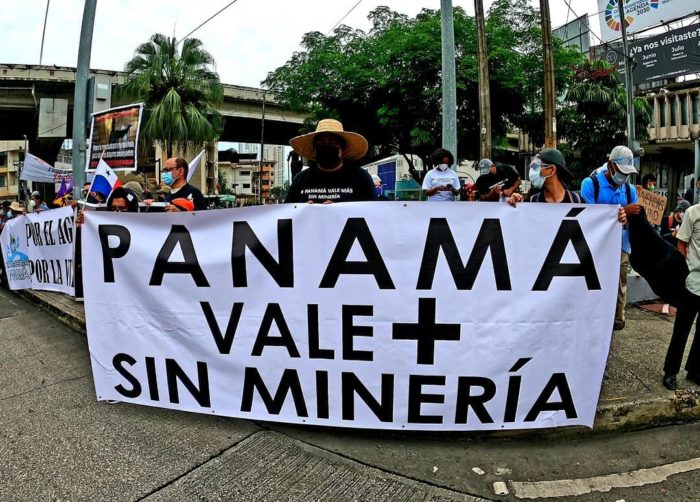
At the same time, administrative processes for companies to get new permits got easier and projects moved forward. The justification was that mineral extraction would supposedly contribute to post-pandemic economic reactivation, but it’s well known that mining tends to divert attention from more sustainable economic sectors at a national level and impoverish local communities.
In Panama and Ecuador — both countries with few industrial mines in operation due to widespread rejection by the affected populations — there have also been attempts to accelerate mining expansion in the name of economic reactivation.
In Ecuador, there is widespread opposition to mining in the country due to its impacts on water, the country’s exceptional biodiversity, and the well-being of small farmer and Indigenous communities.
During his election campaign, current President Guillermo Lasso promoted “human rights and the rights of nature… and the protection of the environment with a sustainable agenda.” However, once he took office in May 2021, he showed his willingness to serve transnational mining interests.
On August 5, he issued Executive Decree No. 151, an “Action Plan for the Ecuadorian Mining Sector,” which seeks to accelerate mining in fragile ecosystems such as the Amazon and high-altitude wetlands (páramos). It gives legal certainty to mining companies by providing a favorable environment for investors, indicating explicit respect for international agreements that favor corporate interests. It likewise proposes the acceleration of environmental permits for mining projects without taking into account the socio-environmental impacts.
Similarly, on May 19, 2021, the Panamanian government presented its strategic plan to base its post-pandemic economic recovery on mining. Given the prevalence of corruption and the constant violations of environmental regulations and the Constitution by mining companies in Panama, citizens see this mining stimulus plan as the government aiming to enrich itself and its cronies.
Faced with the fallacy of national economic recovery through mining, a national campaign platform arose called the Panama Worth More Without Mining Movement (MPVMSM). This broad based movement of environmental organizations, teachers, workers, youth, small farmers, and Indigenous communities opposes mining and the renegotiation of the contract over the only operating mine in Panama, Cobre Panama owned by First Quantum Minerals, which they consider unconstitutional and argue should be canceled.
Despite evidence that upwards of 60 percent of Panamanians support this movement’s aims, the government insists on continuing to promote initiatives aimed at making way for mining expansion in the country.
Truly Essential Resilience and Resistance
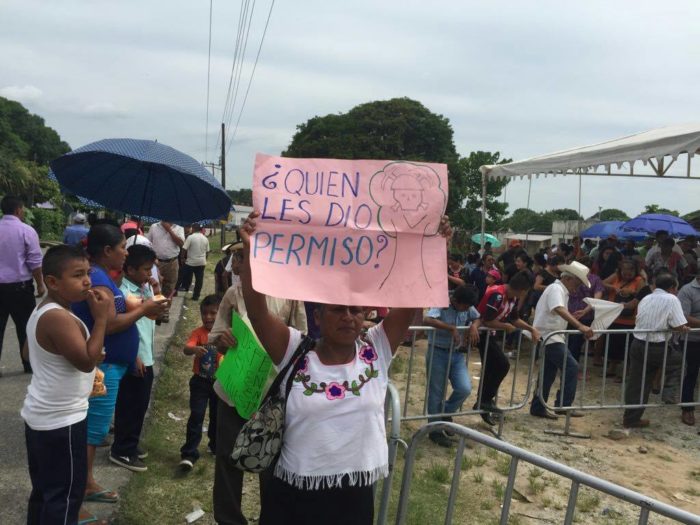
Despite the conditions for peoples’ struggles having gotten harder over the last two years, the resilience and resistance of people fighting from the margins for their land, their water and their community health has persisted, often with women, Indigenous peoples, and small-scale farmers at the forefront.
From Mexico to Argentina, the communities and organizations who shared their experiences for this report have found ways to continue fighting for respect for their self-determination, community health, and their own visions of their future. While some projects moved ahead, others have not been able to overcome tireless community resistance.
Whether communities are fighting to address mining harms or standing in the way of these unwanted projects, their struggles are potent examples of the sort of reimagining and digging in for fundamental change that Arundhati Roy urged at the start of this pandemic.
Through their resistance, mutual care, traditional knowledge, and efforts toward greater food sovereignty and collective wellbeing, these communities and movements demonstrate the urgent need to shift away from a destructive model of economic development that has been forced on people around the world, based on endless extraction to serve international markets with primary materials that are turned into products for mass consumption.
They point out the vital need for a serious reckoning to address the harms that have taken place and to pull back the reins on such militarized mass destruction in order to prioritize peoples’ self-determination and more sustainable ways of living. This is what is truly essential if we hope to ensure collective health and wellbeing now and for future generations.
Main image: President of the Pueblo Shuar Arutam of Ecuador, Josefina Tunki, during a protest along with other Shuar women. Photo: Comunicación PSHA
Jen Moore is a coauthor of the report NO REPRIEVE: COVID-19 and Resistance to the Mining Pandemic and an associate fellow of the Institute for Policy Studies. From 2010 to 2018, she coordinated the Latin America Program at MiningWatch Canada and advised LAB our project The Heart of Our Earth – community resistance to mining in Latin America.

